
Bornholm is a Danish island in the Baltic Sea, to the east of the rest of Denmark, south of Sweden, northeast of Germany and north of Poland.
There are three types of elections in Denmark: elections to the national parliament, local elections, and elections to the European Parliament. Referendums may also be called to consult the Danish citizenry directly on an issue of national concern.
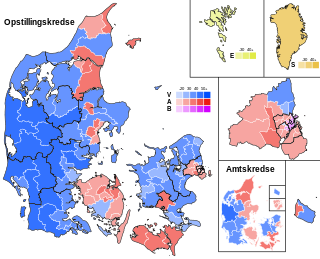
General elections were held in Denmark on 8 February 2005. Prime Minister Anders Fogh Rasmussen's Venstre remained the largest party in the Folketing and his governing coalition with the Conservative People's Party remained intact, with the Danish People's Party providing the parliamentary support needed for the minority government. The Danish Social Liberal Party made the biggest gains of any party, although it remained outside the governing group of parties. The elections marked the second time in a row that the Social Democrats were not the largest party in parliament, a change from most of the 20th century. The Social Democrats lost five seats and leader Mogens Lykketoft resigned immediately after the elections. Voter turnout was 85% in Denmark proper, 73% in the Faroe Islands and 59% in Greenland.
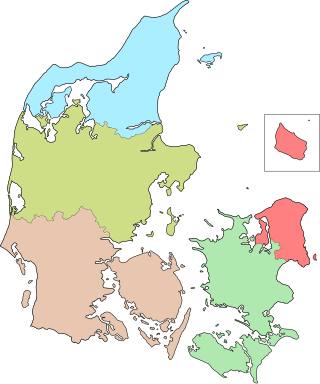
The five Regions of Denmark were created as administrative entities at a level above the municipalities and below the central government in the public sector as part of the 2007 Danish Municipal Reform, when the 13 counties (amter) were abolished. At the same time, the number of municipalities (kommuner) was cut from 270 to 98. The reform was approved and made into a law by the lawmakers in the Folketing 26 June 2005 with elections to the 98 municipalities and 5 regions being held Tuesday 15 November 2005.

The 2007 Spanish local elections were held on Sunday, 27 May 2007, to elect all 66,131 councillors in the 8,111 municipalities of Spain and all 1,038 seats in 38 provincial deputations. The elections were held simultaneously with regional elections in thirteen autonomous communities, as well as local elections in the three foral deputations of the Basque Country and the eleven island councils in the Balearic and Canary Islands.
Landsting elections were held in Denmark on 6 April 1943, with the exception that the electors were elected on 23 March. Along with the corresponding Folketing election, it was the first election during the German occupation, and although many people feared how the Germans might react to the election, the event took place peacefully.

Karen Ellemann Kloch, formerly Karen Ellemann Karabian, is a Danish politician, who is a member of the Folketing for the Venstre political party. She is a former minister, having held the positions of Minister of Fisheries, Equality and Nordic Cooperation, Minister of the Environment and Minister of the Interior and Social Affairs.
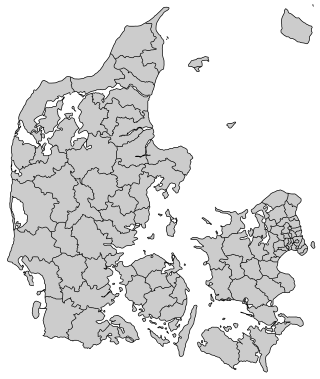
Denmark is divided into five regions, which contain 98 municipalities. The Capital Region has 29 municipalities, Southern Denmark 22, Central Denmark 19, Zealand 17 and North Denmark 11.
Country-wide local elections for seats in municipality and county councils were held throughout Norway on 15 September 2003. For most places this meant that two elections, the municipal elections and the county elections ran concurrently. In addition, several municipalities held direct mayoral elections.

Local elections were held in Denmark on 17 November 2009. Councils were elected in Denmark's 98 municipalities and the five regions. 2468 seats were contested in the municipal elections. 205 seats were contested in the regional elections.
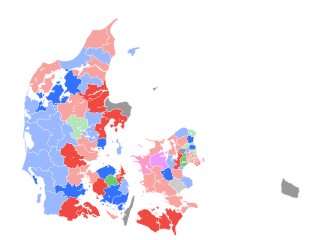
Local elections were held in Denmark on 15 November 2005. 2522 municipal council members were elected in Denmark's 98 municipalities and 205 regional council members in the five regions. Most of these were newly formed municipalities, namely 66 municipalities, that would only begin working from Monday 1 January 2007, as would the newly formed regions, and one municipality, Ærø, which was also part of the reform, which was allowed by the government to commence work for the first time already Sunday 1 January 2006. So the first term of office in this newly created municipality was the whole period of four years from 2006 until 2009. The reform was approved 26 June 2005 by the lawmakers in the Folketing and signature by the head of state (when?). The 238 municipal councils and 13 county councils that were to be abolished 1 January 2007 just continued their work one year more than the term of office (2002-2005) they were elected for until 31 December 2006 and then ceased to exist. Among the remaining 31 municipalities having their new councils elected was Bornholm Regional Municipality that was formed and began its work 1 January 2003. This was only the second time it had a new council elected, the first time being on 29 May 2002, and it was the first time its council served the whole term of office. Bornholm's merger was not a part of the reform, having been decided by the island's voters already on 29 May 2001. It was the new center-right government elected at the end of 2001 that drove the reform through parliament. The 30 municipalities that remained were not merged with other municipalities, so their newly elected councils served the whole term of office 1 January 2006 until 31 December 2009.
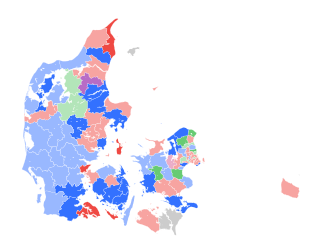
Local elections were held on 19 November 2013 in Denmark's 98 municipal councils, contesting 2,444 seats for the 2014–2017 term of office, and in five regional councils, contesting 205 seats for the 2014–2017 term. Advance voting began on 20 August 2013 in national registration offices in Denmark, hospitals, prisons, etc. Twelve women held the highest political office of mayor in the municipalities in the 2014–2017 term of office.
Local elections were held in Denmark on 18 November 1997. 4685 municipal council members were elected to the 1998–2001 term of office in the 275 municipalities, as well as members of the 14 counties of Denmark.

Local elections were held on 21 November 2017 for Denmark's 98 municipal councils and five regional councils. All 2,432 seats were contested for the 2018–21 term of office, together with 205 seats in five regional councils. In the previous election, there were 2,444 seats in the municipal councils.

Local elections were held in 2021 for Denmark's 98 municipal councils and five regional councils. All 2,436 seats were contested for the 2022–2025 term of office, together with 205 seats in five regional councils. Frederiksberg Municipality had increased their number of councillors from 25 to 29.

Astrid Carøe Rasmussen is a Danish politician and member of the Folketing for the Socialist People's Party. She was elected into parliament in the 2019 general election.
Heidi Farsøe Bank is a Danish politician, who is a member of the Folketing for the Venstre political party. She was elected into the Folketing in the 2019 Danish general election. She has a background as a real estate agent.

Morten Dahlin is a Danish politician, who is a member of the Folketing for the Venstre political party. He was elected into parliament at the 2019 Danish general election.
Leif Lahn Jensen is a Danish politician, who is a member of the Folketing for the Social Democrats political party. He was elected into parliament at the 2007 Danish general election.
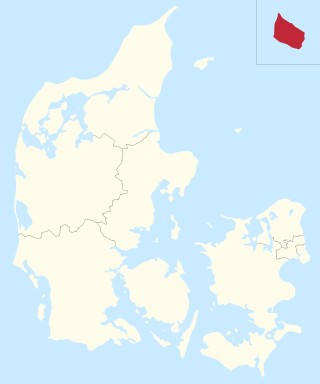
Bornholm is one of the 12 multi-member constituencies of the Folketing, the national legislature of Denmark. The constituency was established in 2007 following the public administration structural reform. It consists of the municipality of Bornholm and the unincorporated archipelago of Christiansø (Ertholmene). The constituency currently elects two of the 179 members of the Folketing using the open party-list proportional representation electoral system. At the 2022 general election it had 30,825 registered electors.














